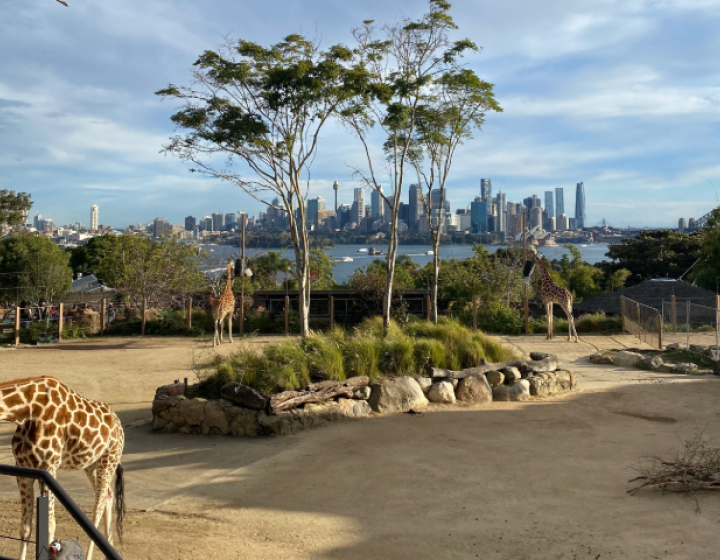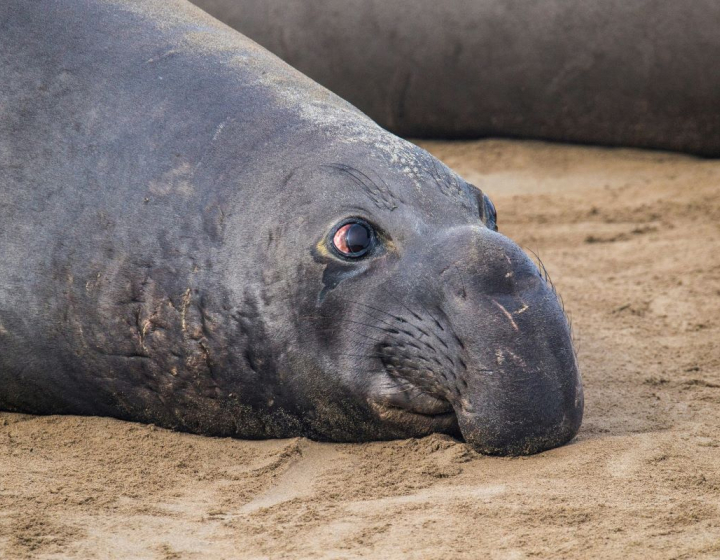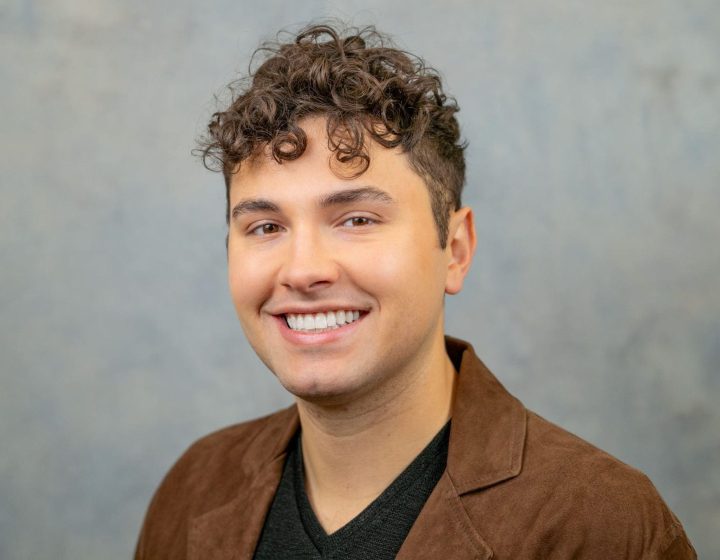Guinea pig loses an eye, gains a herd
When Odin the guinea pig was adopted, his owners — Chris Dunham and Melissa Travis Dunham — named him after the one-eyed Norse god due to a diagnosis of eyelid agenesis, which was hindering the little mammal’s quality of life.
Eyelid agenesis, a congenital disease more commonly seen in cats, occurs when the animal is essentially missing its eyelid, often resulting in damage to the cornea since the animal can’t fully blink or distribute tears.
“There are a few long-term options for treatment,” said Jamie Morrisey, D.V.M. ’92, section chief of exotics at the Cornell University Hospital for Animals (CUHA). Odin was the first case of eyelid agenesis Morrisey had seen in a guinea pig during his time at CUHA.
“You can do topical management to provide tears for him or there’s enucleation — the complete removal of the eye,” Morrisey said. “An in-between measure would be permanent partial tarsorrhaphy. This surgically removes the lid margin down to the underlying skin on part of the eyelid. It’s sewn to heal together, and they can still see out part of the eye that way.”
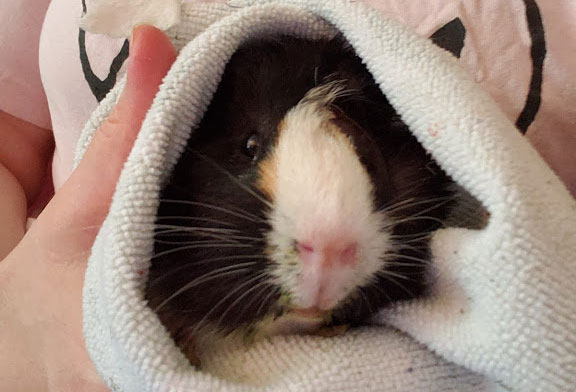
Odin’s unique diagnosis was initially brought to Cornell’s attention when the shelter medicine service examined him at the SPCA of Tompkins County, which rescued Odin’s mother and her two pups.
“When we made the decision to seek foster care, the Dunhams were our natural first choice,” said Dr. Erin Henry, instructor with Maddie’s ® Shelter Medicine Program at Cornell University. “They are incredible volunteers for the shelter and our go-to individuals when we have guinea pigs in need of foster for medical care.”
Melissa Travis Dunham has been involved with the SPCA since 2005 and serves on its board of directors. When she and Chris Dunham took Odin in on a temporary basis, they didn’t realize everyone at the shelter was hoping he would become a “foster failure.”
“We knew Odin would be in great hands, and we (really, I) secretly hoped they would fall in love and decide to adopt him,” said Henry.
“The short version of the story is that we were suckers,” joked Chris Dunham.
Sure enough, it was only a couple of days before they made Odin a permanent part of their coterie of animals. Of their five male guinea pigs, they say Odin is by far the most cuddly, likely because of the medical attention he needed from the start. “In the beginning we were giving him eye drops three or four times a day, so we would be holding him a lot,” said Chris Dunham.
Removal and recovery
Morrisey and veterinarians from the CUHA ophthalmology service determined the middle path was the best treatment for Odin so that he could still partially use the right eye. While the surgery went well, Odin’s stitches came out — the Dunhams suspect his scratching was the cause. After discussing further options with Cornell, they decided to switch to enucleation as a more permanent solution.
“They’re delicate just in general,” said Melissa Travis Dunham. “We didn’t want to put him through that again if it wouldn’t stick, but we didn’t want him to be miserable either.”
“His discomfort was pretty obvious,” added Chris Dunham.
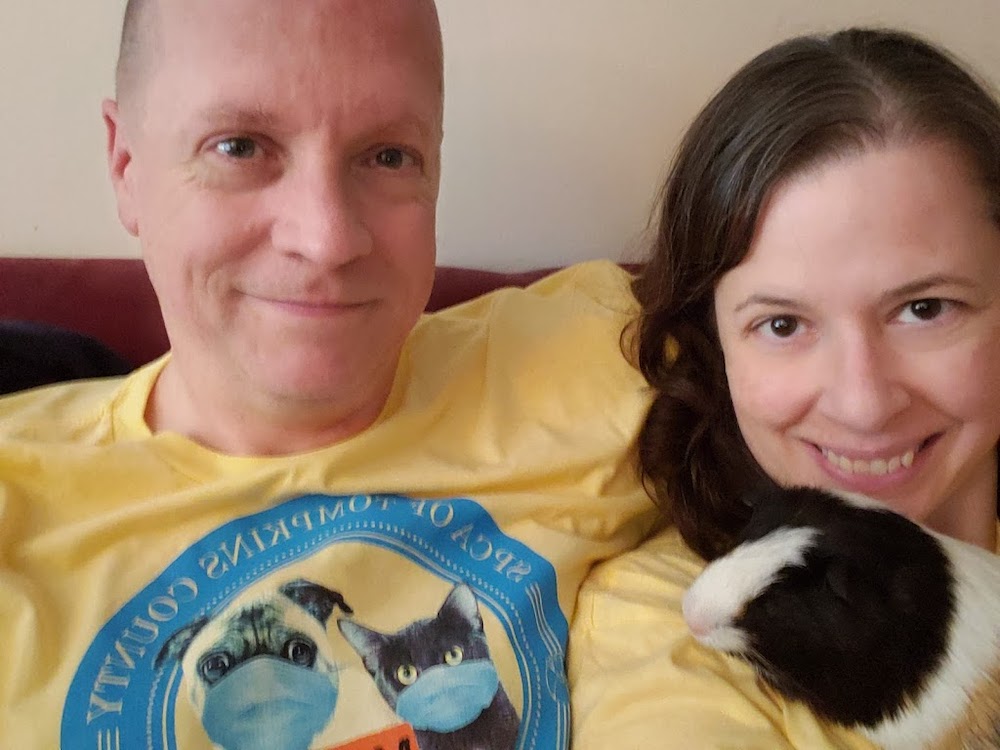
Guinea pigs do not do well under anesthesia, especially after the stress of being alone in a foreign environment away from their herds — the term for a group of guinea pigs. As prey animals, if guinea pigs experience too much stress, their heart can race so quickly that they suffer a heart attack. CUHA clinicians were also mindful of the complicated nature of enucleation, especially in such a small patient.
“There’s a big vascular sinus behind the eye that we had to be careful not to nick,” noted Morrisey.
Fortunately, Odin’s enucleation surgery went well. Veterinarians successfully removed the eye and sent him home for careful monitoring by the Dunhams.
While Odin’s immediate recovery was tricky — he wasn’t interested in eating and had complications with his bladder due to the stress of anesthesia — the little guinea pig rallied thanks to his owners’ dedicated care and the reassuring presence of his herd.
“It’s usually all totally healed within two weeks,” said Morrisey. “His only disadvantage will be that he doesn’t see as well. Guinea pig eyes are on the side of their head, so his field of view is limited, but since he lives with other guinea pigs he’ll be much more comfortable.”
Within weeks, Odin recovered completely. The Dunhams were relieved. “Guinea pigs aren’t really known for their acute vision anyway,” said Chris Dunham.
As prey animals, guinea pigs hide signs of illness to avoid predators’ attention. This can make it challenging for owners to get them the preventative care that they might need. To work around such issues, occasionally the Dunhams administer what they call the “blueberry test.”
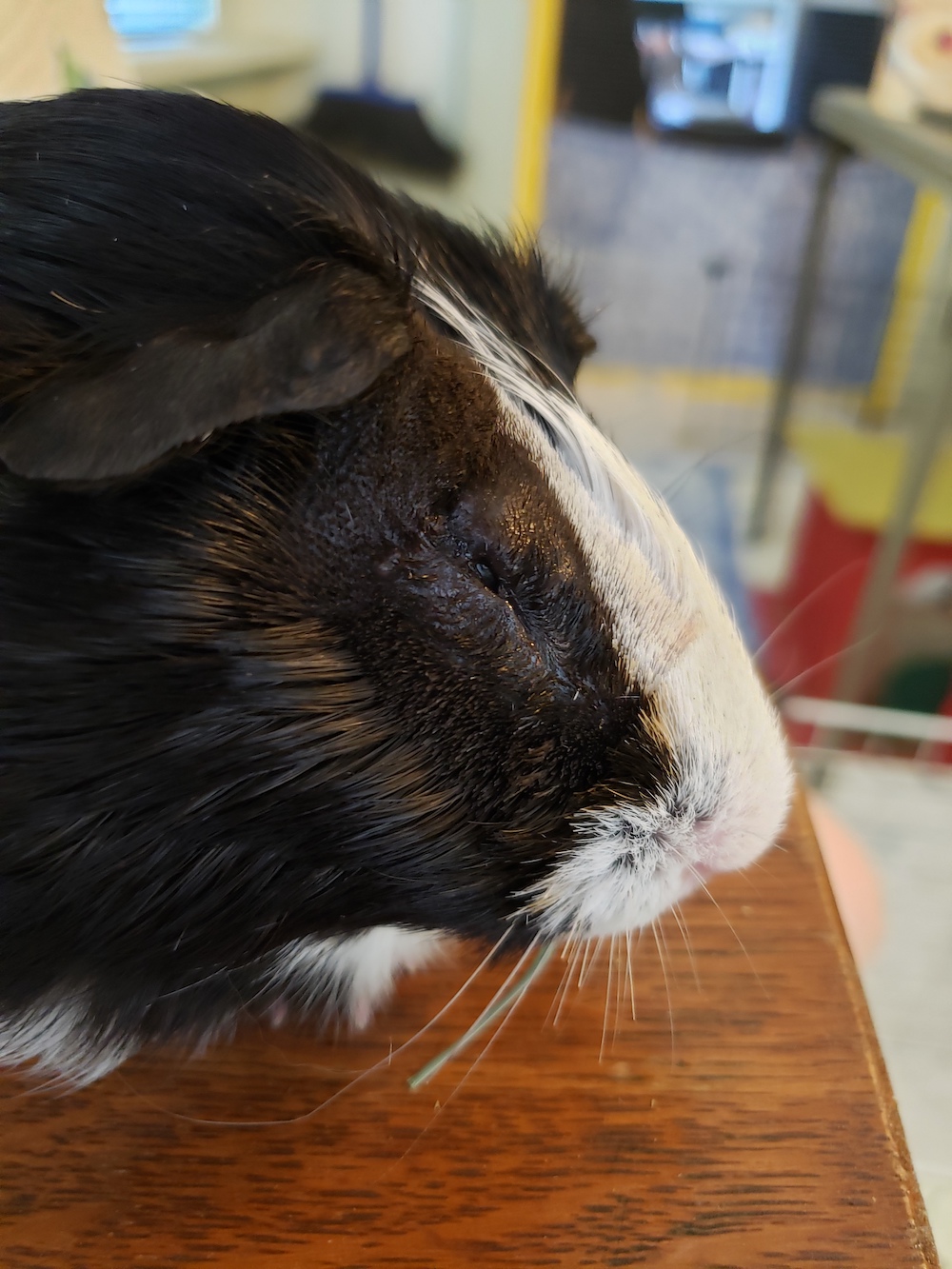
“It’s their favorite treat ever. If we put a blueberry in front of them and they don’t go for it, we know something is wrong,” said Chris Dunham. They also regularly weigh their pigs and know each one’s personality.
Guinea pigs live for about seven years. They mature rapidly; pups will nurse for about three weeks and become sexually mature shortly after. They are more similar to horses than rats or mice, and need a constant source of food to keep their teeth from growing too large.
“Though guinea pigs make excellent pets, it is important to recognize that they have very specific dietary and housing needs,” said Henry.
“Guinea pigs are great pets,” added Morrisey. “They’re very vocal, very interactive — you never have to guess what they’re thinking.”
Odin’s recovery is now complete, and although he does occasionally bump into walls during playtime with his herd, his prognosis for a high quality of life is positive.
The Dunhams, after all the worry and care that went into Odin’s case, said they have no plans to add another member to his herd of five. “And I don’t know if we’ll be answering another of Dr. Henry’s calls anytime soon,” joked Chris Dunham.
Written by Melanie Greaver Cordova
Video by Cornell Vet
All photos provided



